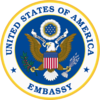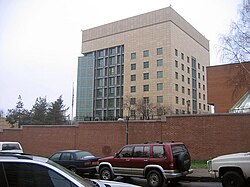U.S. Embassy in Moscow
| Embassy of the United States, Moscow | |
|---|---|
|
Native name Russian: Посольство Соединенных Штатов Америки Москва |
|
 
New embassy as seen from the street
|
|
| Location | Bolshoy Deviatinsky Pereulok No. 8 |
| Coordinates | 55°45′20″N 37°34′59″E / 55.755556°N 37.583056°ECoordinates: 55°45′20″N 37°34′59″E / 55.755556°N 37.583056°E |
| Opened | June 2000 |
| Ambassador | John F. Tefft |
The Embassy of the United States of America in Moscow is the diplomatic mission of the United States of America in the Russian Federation. The embassy complex is located in the Presnensky District in the city center of Moscow. Its address is: Bolshoy Deviatinsky Pereulok No. 8. The US citizen center is located nearby at 21 Novinskiy Bulvar.
The embassy consists of the following sections:
In addition, representatives of a number of U.S. federal agencies work in the embassy.
The embassy oversees the following Consulates General in Russia: Saint Petersburg,Vladivostok and Yekaterinburg.
In 1964, bugs were discovered within the US Embassy in Moscow.
On August 26, 1977, a fire erupted on the eighth floor of the embassy building. Although it was extinguished, a large amount of information was lost or stolen. (Several firefighters were in fact KGB personnel charged with removing sensitive material.)
Construction of a new embassy building began in 1979. In 1985, the building's columns, which had been built by Soviet workers, were found to be riddled with covert listening devices, to such an extent that classified information had to be handled in the old embassy. In retaliation, Soviet diplomats were not allowed to occupy their new embassy in Washington, D.C. The standoff was resolved in 1994 when American workers were allowed to partially dismantle and rebuild the embassy with four completely new upper floors. In 2000, the new building was finally opened with classified business confined to the upper floors, while standard consular business is conducted in the insecure lower floors.
On a Russian television program, Igor Korotchenko, editor of a magazine called National Defense and a former specialist in Russia's military command, described the structure of the current embassy building as follows: "The N.S.A. is a global electronic vacuum cleaner, which monitors everything. Look at the top two floors of the new building of the U.S. Embassy—it's a huge antenna, which listens to the Moscow air."
...
Wikipedia

